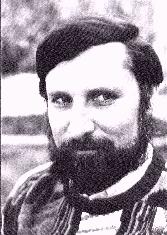PHIL 616.600: Modern Philosophy Graduate Seminar
Dr. Stephen H. Daniel, Spring 1996
The Modern Philosophy seminar examines 17th and 18th century philosophy
with special emphasis on contemporary continental strategies of interpretation.
Each member of the seminar focuses on how an early modern thinker is
interpreted by a current poststructuralist, deconstructionist, feminist, or critical theorist.
The selection of thinkers and works to be discussed in this particular way
will be determined by choices made by members of the seminar during the first
week of class. A list of choices is given below. Each student's choice
determines the topic and timing of his or her in-class presentation and term
paper.
Texts:
Garrett Thomson, An Introduction to Modern Philosophy (Page
numbers below.)
Supplemental readings will be available to students at Notes-n-Quotes or from the instructor.
Each student is expected to have (for purposes of reference) a copy of the
major works discussed in the text: Descartes' Meditations, Spinoza's
Ethics, Leibniz's Monadology and Discourse on Metaphysics, Locke's Essay concerning Human Understanding, Berkeley's
Principles of Human Knowledge, Hume's Enquiry concerning Human
Understanding, Kant's Critique of Pure Reason.
Jan. 16 Introduction, Postmodernist Historiography (1-6)
18 Bacon, Montaigne (supplement)
23 Descartes: Self (8-23)
25 Descartes: God (24-34)
30 Descartes: World (35-48)
Feb. 1 Hobbes (supplement)
6 Spinoza: God (49-61)
8 Spinoza: Mind (62-70)
13 Spinoza: Knowledge (71-76)
15 Leibniz: Truth (77-88)
20 Leibniz: Monads (89-96)
22 Leibniz: God (97-108)
27 Locke: Ideas (110-26)
29 Locke: Substance (127-35)
Mar. 5 Locke: Knowledge (136-46)
7 Berkeley: Immaterialism (147-62)
19 Berkeley: God/Minds (163-72)
21 Hume: Ideas (173-82)
26 Hume: Causality (183-94)
28 Hume: Identity (195-207)
Apr. 2 Condillac & Diderot (supplement)
4 Vico, Rousseau, & Herder (supplement)
9 Kant: Sensation (210-222)
11 Kant: Concepts (223-31)
16 Kant: Principles (232-42)
18 Kant: Dialectic (243-55)
23 Kant: ethics (supplement)
25 Kant: aesthetics (supplement)
May 8 (Wednesday) Term Paper due in office 10 a.m.
Office Hours (Blocker 510): Tuesday 11:00-12:30, 2:00-5:00; Thursday 2:00-5:00
Office phone: 845-5619
E-mail address: sdaniel@tam2000.tamu.edu
Assignments/Grading:
Outline (30% of grade; presentation in class is included in the grade): Each student will prepare a seminar report on a selected work or body of work. The report, presented and discussed during the semester, is an outline of the main term paper (to be turned in at the end of the semester). The outline should have the following structure:
1. Contents (a table of contents of all headings and subheadings, pages)
2. Main sources (primary sources, locations of translations, biblio info)
3. Studies (annotated bibliography of secondary sources of most use in this paper)
4. Abbreviations
5. Introductory remarks about the historical context of the texts)
6. The actual outline, with appropriate divisions and subdivisions
7. Conclusions
8. Personal Evaluation
Short Research Paper (30% of grade): Each student will complete an 8-10 page research paper on a topic covered during the first half of the semester. The topic must be on a thinker other than the one with whom the student's outline is concerned. It should be turned in by March 1.
Both the short research paper and the term paper should have the following structure:
a) after the title, there should be one or two paragraphs indicating
the topic of the paper, the problems it plans to address, and the
order of the main points to be made.
b) each section of the paper should have a title and should be at
least 3-4 pages long.
c) a final brief (less than a page) section, entitled "Concluding
Remarks," indicating how the issues you raise clarify the problems
raised by the philosopher you are studying.
d) endnote citations should adopt the following format:
(author, book) Pamela Major-Poetzl, Foucault's Archaeology of
Western Culture (New Haven: Yale University Press, 1983), 32-35.
(translator) Michel Foucault, The Archaeology of Knowledge,
tr. Sheridan Smith (New York: Harper and Row, 1972),
122.
(essay in book) Michel Foucault, "Nietzsche, Freud, Marx," in
Transforming the Hermeneutic Context: From
Nietzsche to Nancy, ed. Gayle L. Ormiston and
Alan D. Schrift (Albany: State University of New York
Press, 1983), 66-67.
(journal article)Daniel Stempel, "Blake, Foucault, and the Classical
Episteme," PMLA 96 (1981), 389.
Any citations of a work referred to in a previous note should list
simply the author's last name and an abbrieviated title (for example:
Stempel, "Blake, Foucault," 391). The exception to this rule: when
the previously referred to work is in the note immediately prior to a
subsequent reference, type Ibid. if it is from the same page, and
Ibid., if from the same source but from another page.
Term Paper (40% of grade): turned in at the end of the semester, the
term paper is the fulfillment of the promise offered by the class outline.
Topics on which presentations and papers can be done:
Foucault/Derrida on Descartes
Le Doeuff or Irigaray or Kofman on Descartes
Deleuze or Negri or Althusser on Spinoza
Deleuze on Leibniz
Derrida on Condillac
Gadamer or Adorno on Vico
Lacoue-Labarthe on Diderot
Deleuze on Hume
Derrida or Starobinski on Rousseau
Deleuze or Gadamer on Kant
Foucault or Lyotard on Kant
Derrida on Kant
Attendance and participation can affect the grades of the outline and papers.
 Go back to Steve Daniel's Home Page
Go back to Steve Daniel's Home Page
 Go to the Texas A&M Philosophy Home Page
Go to the Texas A&M Philosophy Home Page
 Go to the Texas A&M Philosophy Home Page
Go to the Texas A&M Philosophy Home Page
 Go to the Texas A&M Philosophy Home Page
Go to the Texas A&M Philosophy Home Page